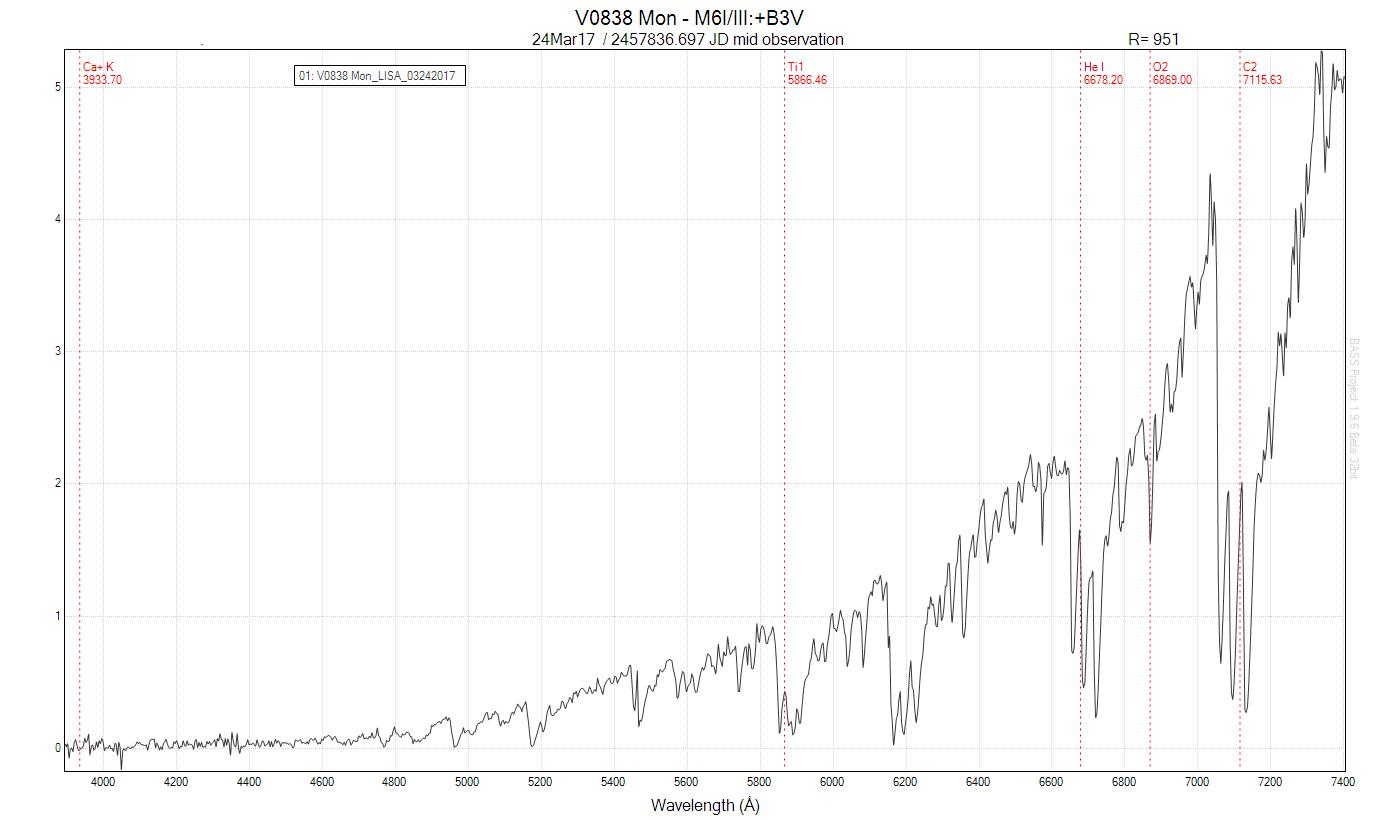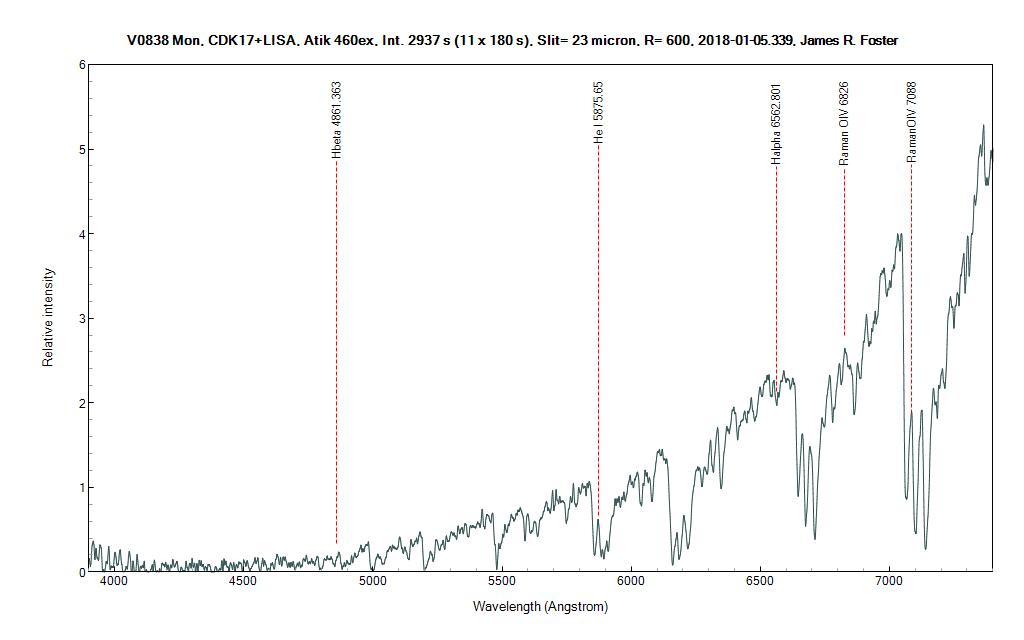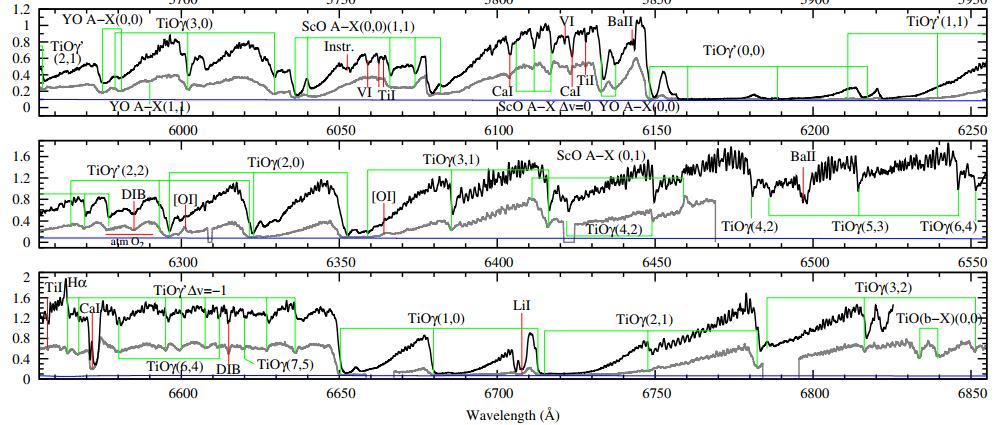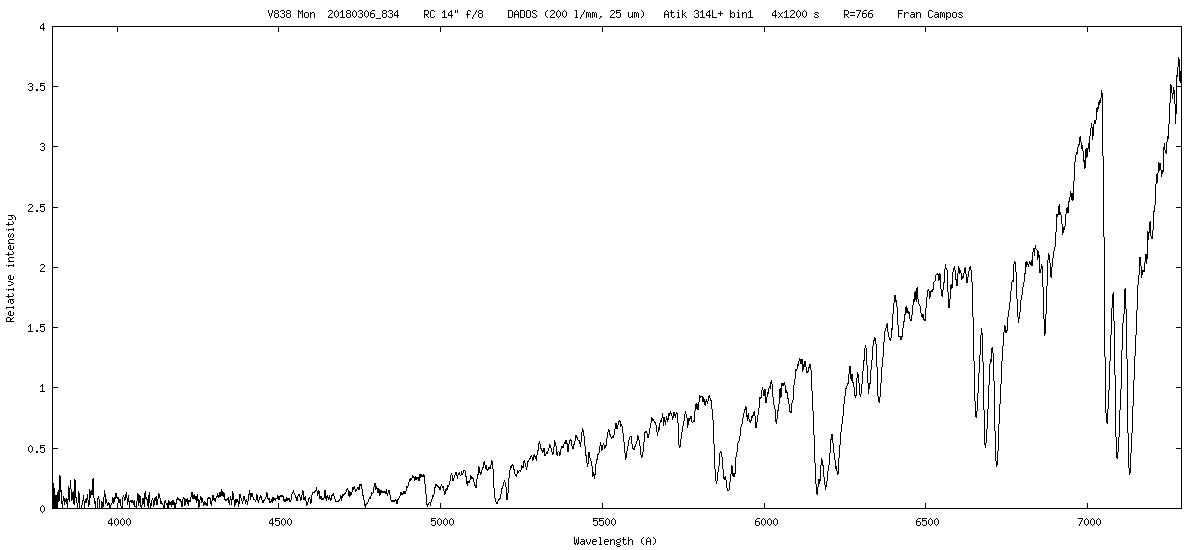Page 1 of 1
V0838 Monoceros Spectrum
Posted: Sat Mar 25, 2017 9:27 am
by James Foster
Here's another Isis processed spectrum of the Variable in Monoceros V0838 Mon that made those beautiful light echo shells seen in the HST shots;
see
https://www.youtube.com/watch?v=U1fvMSs9cps
This spectrum came from 10x300sec exposures 2x2 binned with the LISA spectroscope on the CDK17 with a 19 micron slit and imaged with the Atik 460ex CCD; R= 951
I could only identify a few lines and the HeI is highly suspect; almost no hint of the balmer series except the nearby (to H-epsilon) Ca+ K line in the near UV; see:

I used the A4V star, SAO133870, to calculate an instrument response for reducing the V0838 Mon data. I also clipped some of the data long-ward of 7400A since this was
causing my short wavelength data to be very small on the y-axis.
James
Re: V0838 Monoceros Spectrum
Posted: Sat Mar 25, 2017 4:31 pm
by Francois Teyssier
Hi james,
This is the first time I see a spectrum of this fantastic star
Mag V = 13.5! Congratulations!
Very interesting
Did you measure the velocities of the absorptions?
It should be welcome in the next letter
Best regards,
François
Re: V0838 Monoceros Spectrum
Posted: Sat Mar 25, 2017 7:19 pm
by Joan Guarro Flo
Congratulations James ! This is a very good job !
Cheers, Joan.
Re: V0838 Monoceros Spectrum
Posted: Sun Mar 26, 2017 8:10 am
by James Foster
To: Joan,
Thanks for the words of encouragement! I have 100s of spectra to reduce, but these Isis derived spectra gives me confidence
that my spectra will be of use to the professionals I've been in contact with for various projects.
To: François,
I will velocity calculation after I learn Gnplot so I'll continue to "wean-off" BaSS; I still like BaSS for spectra plotting for elemental lines.
I was taking photometric data on V838 Mon with a C-11 about an hour before this spectra. Think it was brighter than 13.5, but will confirm
this soon as I cannot shoot anymore with the C-11 as its hitting meridian just as astronomical twilight ends. For photometry (and my backyard trees)
I shoot objects rising in the east until they hit meridian at the beginning of the evening.
For spectroscopy with the CDK17, I shoot objects just East of meridian and setting west, so I'll still be able to hit V0838 Mon for another month or two,
but my C-11 is finished and photometric data (started in Nov16) and ready to be reduced for this season.
Re: V0838 Monoceros Spectrum
Posted: Sat Jan 06, 2018 2:11 pm
by James Foster
Here is my latest low resolution spectrum (R=591) of V0838 Monoceros, taken on 05Jan2018:

I took 15x180sec exposures, but had to exclude 4 of them due to clouds dimming the object. Here is an IS processed 2D image of the combined spectrum:

Isis did a nice job of excluding the very very strong Hg lines (image shot from within 20Km of downtown Los Angeles...population over 13 million!) and other
artificial "parasitic" light from V0838 Mon's actual continuum. I miss shooting these spectra from my dark sky site at 2500m, but the weather prevents me from
traveling there since snow and ice is present on the high mountain roads and its almost 100% cloudy this season!
James
Re: V0838 Monoceros Spectrum
Posted: Mon Jan 08, 2018 3:10 am
by Christian Buil
James, excellent spectra of this famous object !
For the memory and archive, my first spectra of this object, taken very soon after the discovery, in February 2002:
http://www.astrosurf.com/buil/us/nmon/nmon.htm
A long time ago... and a very good moment. Note change of the spectral type during the time... I'll have
to redo a visit of this object in a few times too.
Christian
Re: V0838 Monoceros Spectrum
Posted: Mon Jan 08, 2018 7:28 am
by James Foster
Thanks! Nice looking high resolution spectra from 2002 when V838 Mon outburst. I will try V838 Mon is the LhiresIII in Ha when the skies clear up.
My spectra work only started in 2014 with SA200 so I have a long way to go....hope to get the eShel down the road when I
move to a darker sky site just before retirement in 3-5 years.
James
Re: V0838 Monoceros Spectrum
Posted: Thu Jan 11, 2018 1:59 pm
by Francois Teyssier
Dear James,
Nice spectrum as usual. Should be interesting to compare with the previous.
Identification: no Raman OVI in this star. Ramn OVI is very specific to symbiotic stars (about 50% of symbiotics show Raman OVI). The formation of these lines need very high temperature of the hot component to ionize O to O5+ (138 eV, i.e. temperature > 140 000 K).
Raman OVI in symbiotics is strongly correlated with, for instance [Fe VII]
List of publication about V838 Mon with identifications
https://www.aanda.org/articles/aa/pdf/2 ... 858-11.pdf
https://arxiv.org/pdf/0812.4213.pdf
http://adsabs.harvard.edu/abs/2007ASPC..363...13M
The impressive aborptions are molecular bands:

- V838Mon.PNG (134.03 KiB) Viewed 11416 times
Of course, the spectrum is welcome for the base
All the best,
François
Re: V0838 Monoceros Spectrum
Posted: Fri Jan 12, 2018 1:58 am
by James Foster
Francois,
Great high resolution spectra of this interesting object! I need to check out this Raman OVI line in my other spectra
of symbiotics. I'll check-out your other source references as well for the astrophysical "nuts n bolts" of symbiotic spectra physics.
James
Re: V0838 Monoceros Spectrum
Posted: Wed Mar 07, 2018 8:11 pm
by Francisco Campos
Fantastic work, James, this star is really outstanding. I stil don't know how to interpretate this spectrum, these very strange triple absortion bands seems unique... at least I have not seen somethink like this in any star.
Last night I tried to catch this star. Here is my result. Not easy even with a 14" scope... when light pollution is high.

- _v838mon_20180306_834_FPC.png (9.04 KiB) Viewed 11142 times
Greetings,
Fran



